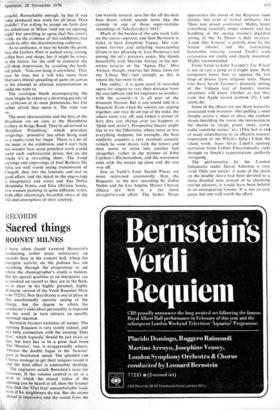RECORDS
Sacred things
RODNEY MILNES
I have often found Leonard Bernstein's conducting rather more satisfactory on records than in the concert hall, where his energetic activity on the podium has me searching through the programme to see where the choreographer's credit is hidden. But his special qualities as an interpreter are as marked on record as they are in the flesh, as is clear in his highly personal, highly dramatic version of the Verdi Requiem Mass (CBS 77231). Not that drama is out of place in this unashamedly operatic setting of the liturgy, but the degree to which the conductor's individual personality is imposed on the work in turn attracts an equally personal reaction.
Bernstein favours extremes of tempo. The opening Requiem is very stately indeed, and has little connection with the ensuing 'Dies Irae', which logically should be just twice as fast, but here has to be a great deal more The 'Hostias', too, is exaggeratedly adagio, whereas the double fugue in the 'Sanctus' goes at breakneck speed. The splendid Ise Chorus manage to get their tongues round it and the final effect is undeniably thrilling.
The engineers match Bernstein's taste for extremes. If the volume control is set at a level at which the muted 'cellos of the opening can be heard at all, then the listener may find the 'Dies Irae' uncomfortably loud, even if his neighbours do not. But the stereo spread is impressive and the sound from the
Ls° warmly natural, save for the off-the-beat bass drum, which sounds more like the cannon in one of those super-realistic recordings of Tchaikovsky's '1812.
Much of the burden of the solo work falls on the mezzo soprano, and here Bernstein is lucky to have Josephine Veasey. Her con- tained fervour and unfailing musicianship (listen to her phrasing in 'Lux Perpetua') are among the set's greatests assets. She blends beautifully with Martina Arroyo in the not- orious octaves of the 'Agnus Dei.' Miss Arroyo, though, reserves her finest form for the `Libera Me'—fair enough, as this is where she has most to do.
One oddity : it is quite usual in recorded opera for singers to vary their distance from the microphone and for engineers to monkey with the acoustic—it is all part of the dramatic illusion. But it can sound odd in a Requiem. Even when the soloists are singing together, one may be on top of the mike, the others some way off, and within a matter of bars they can change over (as happens at `Quid sum miser'). Prospective buyers might like to try the Offertorio, where more or less everything happens; for example, the bass suddenly acquires a very resonant acoustic (which he soon shares with the tenor) and then seems to retire into another hall altogether, rather in the manner of John Culshaw's Rhinemaidens, and the movement ends with the mezzo up close and the rest way off.
Just as Verdi's Four Sacred Pieces are more restrained emotionally than the Requiem, so the new recording by Zubin Mehta and the Los Angeles Master Chorale (Decca SET 464) is a far more straightforward affair. The Stabat Mater approaches the mood of the Requiem most closely, but even at lyrical outbursts like 'Quis non posset contristari' Mehta keeps everything tastefully under control, and his handling of the ageing master's dignified setting of the Te Deum is duly reverent. `Laudi Alla Vergine' is prettily done by the female chorus, and the fascinating harmonies weaving around Verdi's scala enigmatica are coolly and clearly presented. Highly recommended.
From Verdi to John Tavener's The Whale is not so vast a jump as it might seem. Both composers know how to squeeze the last drop of drama from religious texts. Those who have heard Tavener's dramatic setting of the Vulgate text of Jonah's marine adventure will know whether or not they want this Apple record (SAPCOR 15). 1 cer- tainly do.
Some of the effects are not those normally associated with oratorio—like pulling a ruler sharply across a sheet of glass, the random shouts heralding the storm, the instruction to the chorus to 'neigh, grunt, snort, yawn, make vomiting noises,' etc. (This last is one of many contributing to an effective musical impression of the Whale's belly.) I find the whole work, from Alvar Lidell's opening narration from Collins Encyclopaedia right through to Jonah's expectoration, endlessly intriguing.
The performance by the London Sinfonietta under David Atherton is very vivid. Only one moan: if some of the space on the double sleeve had been devoted to a more detailed note instead of to charming marine pictures, it would have been helpful to an unsuspecting listener. It is not an easy piece, but one well worth the effort.














































 Previous page
Previous page